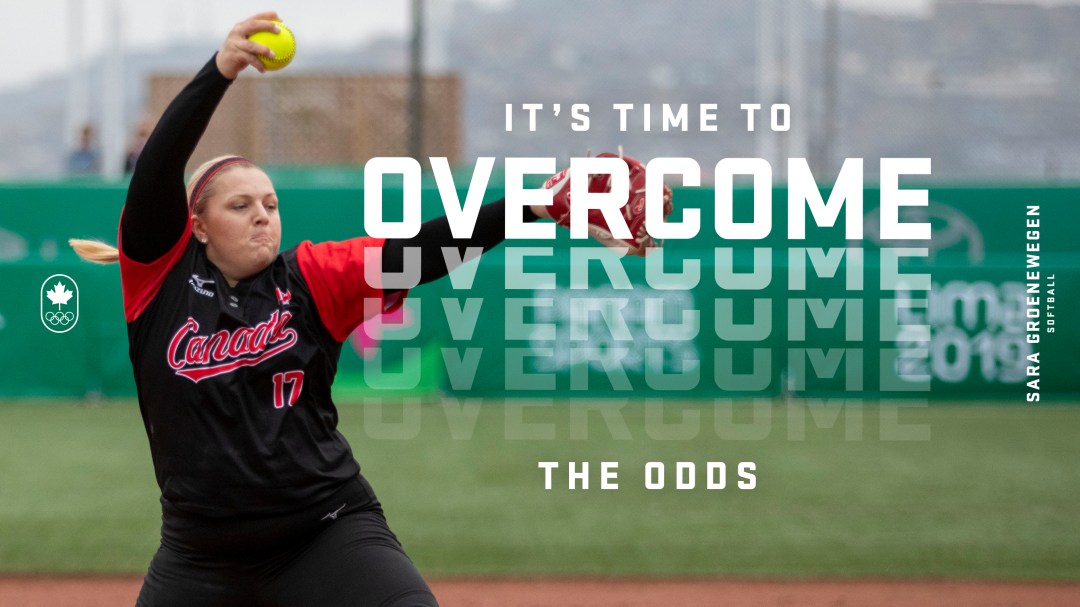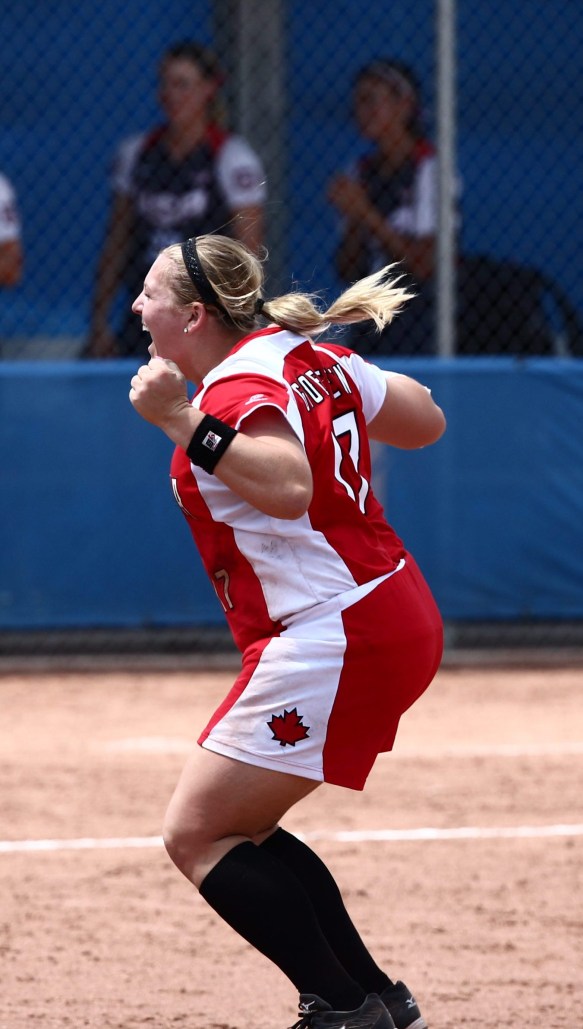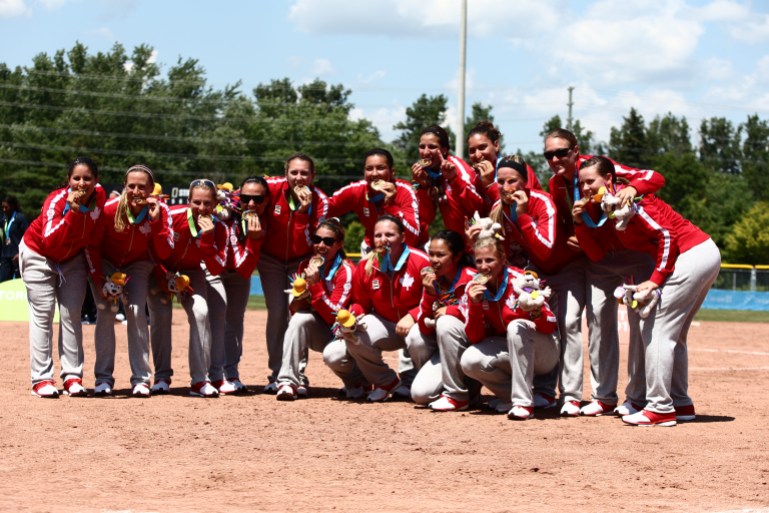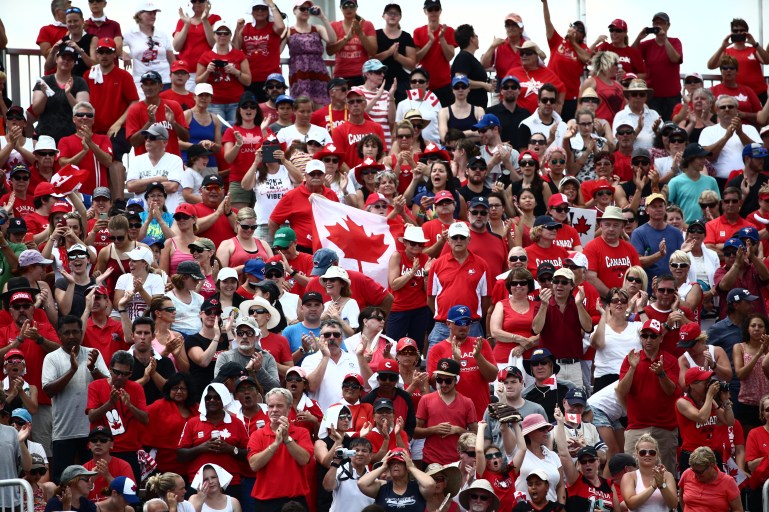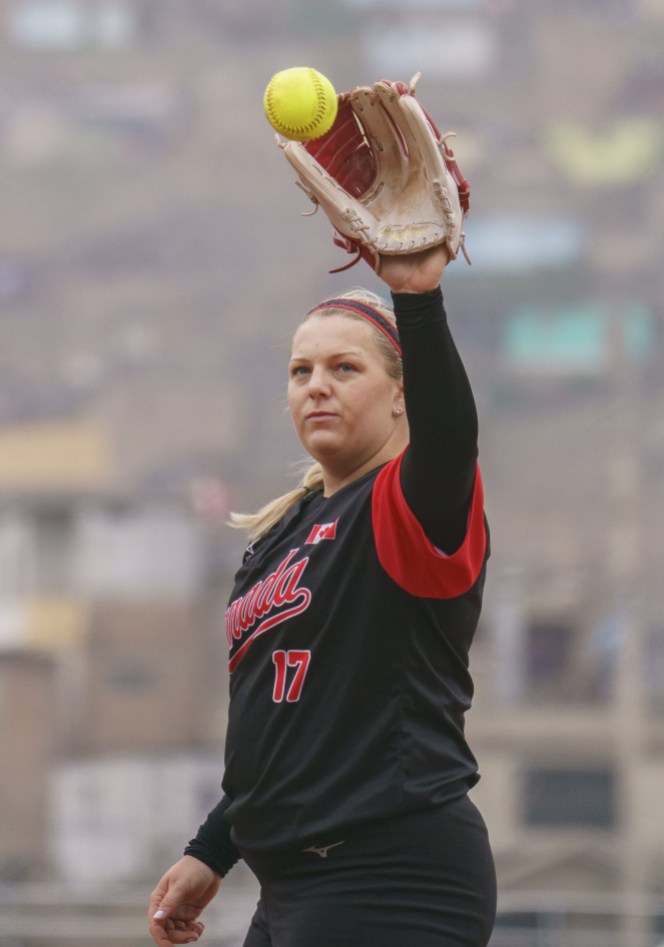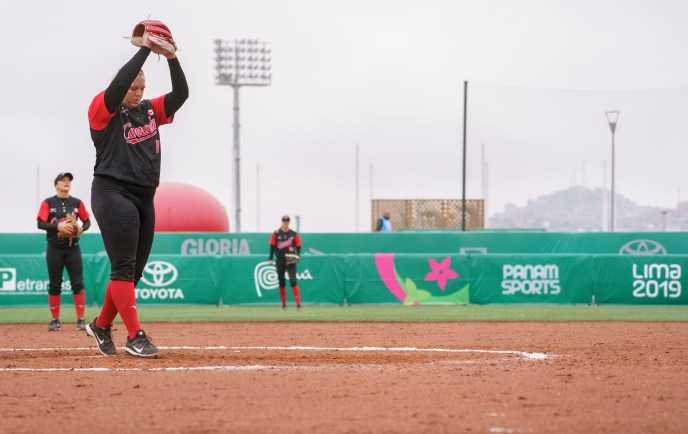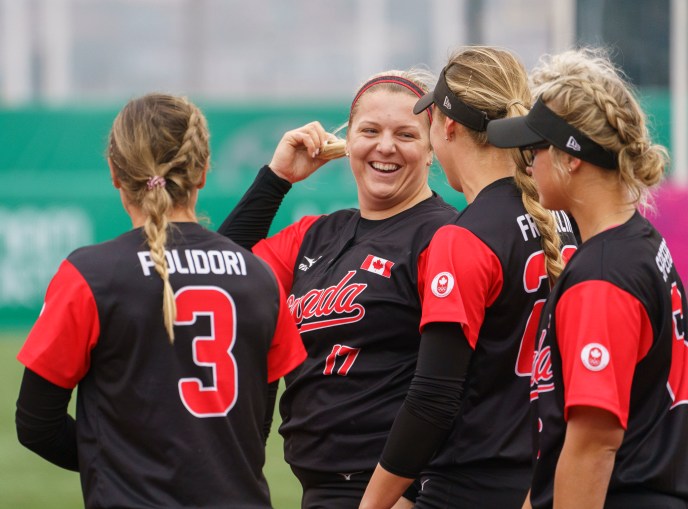Softball star Sara Groenewegen: “Being an athlete saved my life”
Resilient, adaptable, and stubbornly positive.
If I were asked to describe myself, those are the three things I would come up with.
As a high-performance athlete who is a Type 1 diabetic, I am no stranger to adversity and I am not afraid of facing it head on. But like seemingly everyone else in the world, I had no idea what was in store for 2020. Everyone who has been fortunate enough to survive this year would also be able to describe themselves as the three things I mentioned above.
I have been lucky to practically grow up playing on the national softball team; my first season was when I was in grade 12. I have experienced some of my life’s highest highs on this team, but also some of my lowest lows.
My favorite memory is hands down the 2015 Pan American Games in Toronto. We do not often get to experience multi-sport games (softball was unfortunately taken out of the Olympic Games after 2008 but will return at Tokyo 2020) and this was my first Pan Am Games experience.
Our motto that year was ‘Fear the Leaf’, which encapsulated us not wanting to be known as ‘the nice, friendly Canadians’ on the field. Everything just seemed in sync and aligned and we won the gold medal, Canada’s first in women’s softball at the Pan Ams in 32 years.
My favorite part of that entire experience was the crowd. I am sure more than half of the people there didn’t know anyone on the team personally, but I had never believed in having a ‘home field advantage’ until that tournament. You could feel the Canadian pride when walking onto the field. Before the final we had a team meeting and our coach said, “These fans came to cheer for something, so give it to them”, and I am happy that we did.
Fast forward three years to 2018 and the tone shifts completely.
What started as a normal summer of playing and competing for Team Canada was halted suddenly a week before our world championship. I went from being a healthy 23-year-old athlete with a fever and back pain to waking up in a hospital bed with 10 lines going in and out of my body keeping me alive.
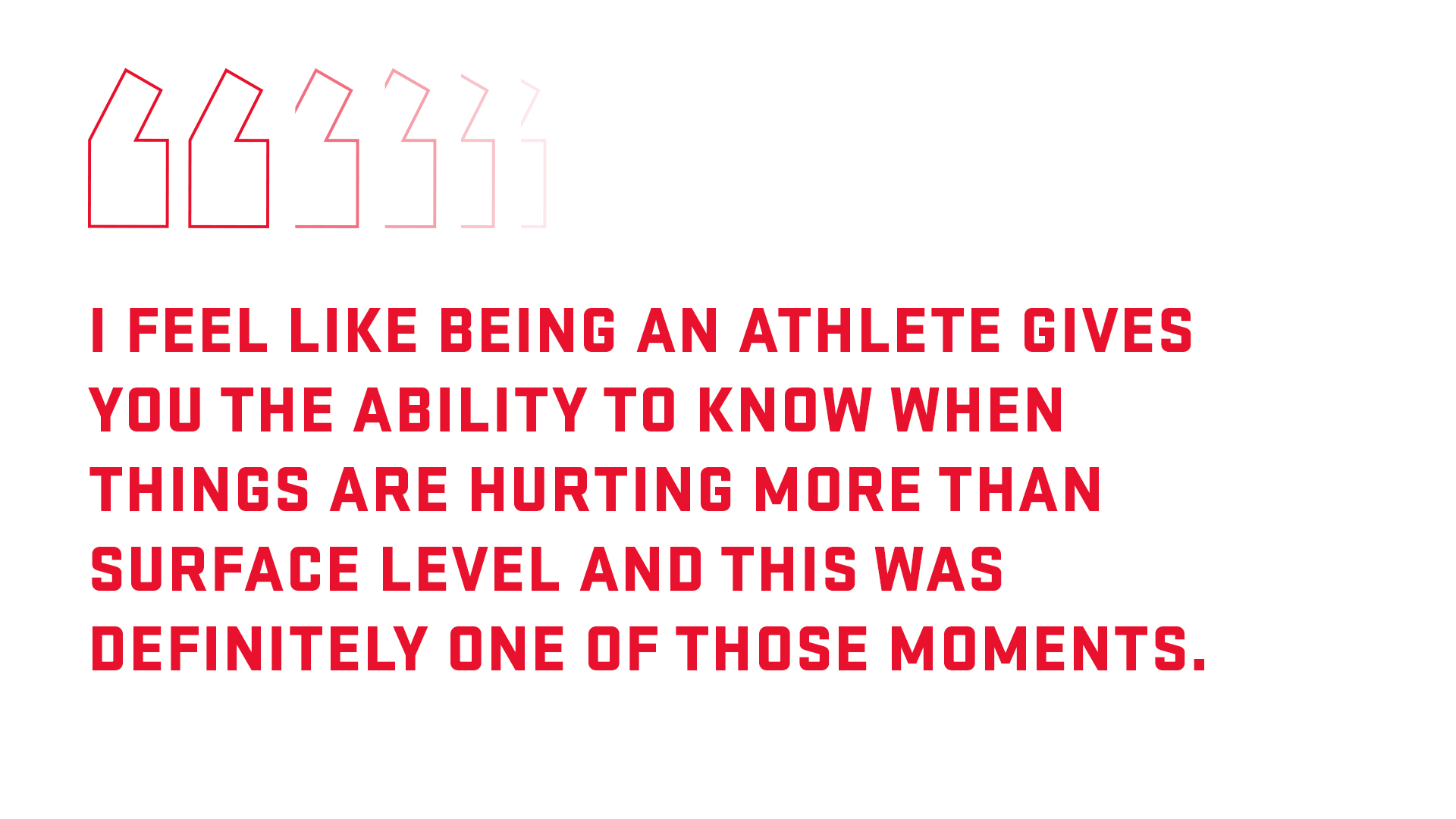
We were playing in the Canada Cup in mid-July, a tournament that happens every year at Softball City in Surrey B.C., which also happens to be my hometown.
My insulin pump had broken that week and my blood sugars were all over the place. Type 1 diabetics, like myself, live with a compromised immune system already, but when blood sugars are higher than they should be, our bodies prioritize simply staying alive rather than focusing on the immune system. Retrospectively thinking, my blood sugars were most likely spiking so bad because of the infection my body was fighting, but that is not something I thought at the time.
After a few days of having a severe fever and no relief, my athletic trainer and I thought it would be a good idea to go to the hospital. I remember checking in, getting my wristband, and being in so much pain that I had to curl up in a ball on the floor.
The doctors initially wanted to send me home, saying it was a bladder infection, but deep down I knew it was something worse – way worse. There was a moment where they wanted me to pack up and be on my way and I refused to leave and told them to figure it out.
I do not remember this.
I feel like being an athlete gives you the ability to know when things are hurting more than surface level and this was definitely one of those moments.
After getting imaging done, the doctors noticed my lungs were full of fluid and that it appeared that I had pneumonia. After being told this, we thought that I could recover quickly and fly out later to meet up with my team in Japan.
This is when things started to unfold quickly.
I had a coughing attack that evening and was not able to breathe. The doctors decided to put me into a medically induced coma and on life support. Everything became incredibly urgent. You can’t treat something effectively if you do not know what you are treating and, at this point, it was still a mystery as to what was wrong with me.
I do not remember any of this happening, but I am sure my family and teammates all remember where they were when they were told I had a 3% chance of surviving.
I cannot imagine being my teammates about to play in the world championship, which just happened to be an Olympic qualifier, and have that thought hanging over their heads. I commend them for their emotional strength throughout that time.
About ten days later, at a different hospital, the doctors started slowly taking me off life support and the medications that I was on. The first memory I have of ‘coming to’ was me seeing my dad and saying, “Nice to see ya”. I could honestly write a book on all of the things that I thought had happened to me while I was in a coma, but one of them was that I thought my dad had passed away, so seeing him was a pleasant surprise.
It turned out I had Legionnaires disease, which is a severe form of pneumonia. Contracting Legionnaires disease is extremely rare, and it is usually contracted through water vapor. The doctors were saying that I could have contracted it 2-10 days before my first symptoms, but what were my first symptoms? In the two weeks before I was in the hospital, I had been in Japan, Los Angeles, and Surrey. While I was in L.A., there was a day that I had been sick but my trainer and I just assumed that it was food poisoning.
Why was I the only one to get sick? What was it from? Air conditioning? Tap water? The air circulating on the plane? I think that the worst part is that I will never be able to narrow it down. But there is one thing that I do know: being an athlete saved my life. The doctor that I had been transferred to said that if I wasn’t as young and healthy as I was, I wouldn’t have survived.
There was no question of whether or not I was going to come back to softball; the question was how and when.
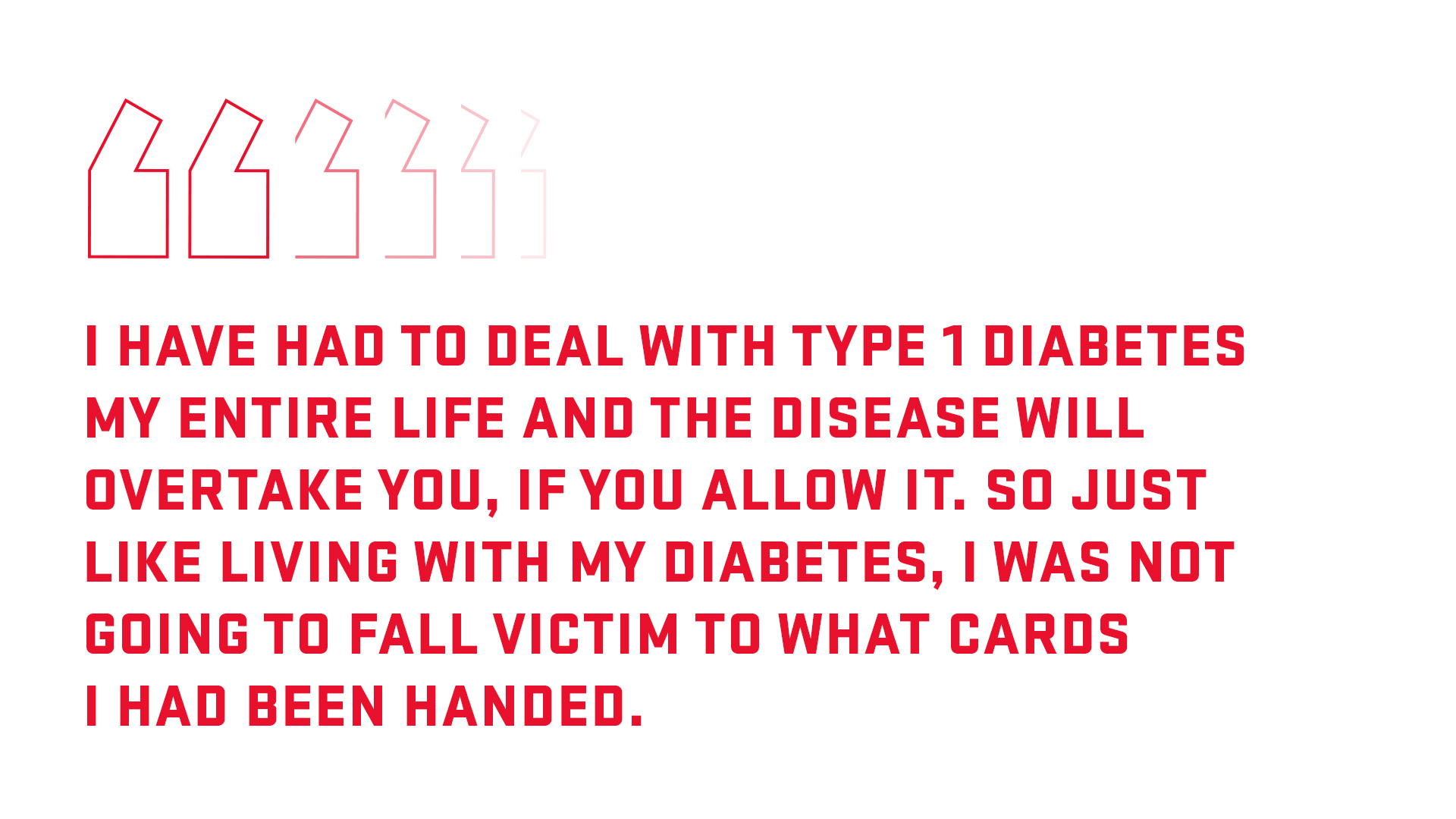
Our team didn’t qualify for the Olympics that summer, so we had one more chance in 2019 and I wasn’t going to let anything get in my way of helping our team make history. One of my teammates was getting married on September 15 and I was determined to go. I was sent home from the hospital the first week of August to be put on bedrest. But I made a quick recovery and was able to not only make it to Toronto for the wedding, but I was back in the gym that following week.
We had a training camp the first week of January. Coach Smith was forgiving if I did not show up ‘ready’, but I didn’t want what happened to me to be an excuse. We played intrasquad games and it was my time to pitch.
Stepping on the mound, digging my cleats in the dirt, and competing again felt like home. I didn’t skip a beat. I was extremely proud of how I showed up because six months prior I couldn’t even walk down the hospital hallway by myself.
The 2019 season became one of my best with Team Canada. At Lima 2019, I threw a perfect game versus Venezuela, Canada’s first perfect game ever at the Pan Ams. My team played stellar defense behind me and scored a lot of runs. Just like in 2015, everything seemed to be in sync.
Although we didn’t win the gold, losing in the final, our team felt ready for our last Olympic qualifying opportunity. We weren’t going to let anything come in the way of our dreams.
After a retreat in Whistler, we drove back down to the lower mainland, to Surrey. Softball City is not only the field I grew up playing on, but it was the same field we were at when I was hospitalized in 2018. Now we had the chance to qualify for the Olympic Games on it. Talk about a full circle moment!
This tournament was the biggest of my entire life. Although we faced some adversity when we lost to Mexico, a win against Brazil booked our ticket to Tokyo. Having my friends and family there to watch me was really special and made every adversity I had faced in the past seem non-existent.
Adversity can be defined as “an adverse or unfortunate event or circumstance”, but what isn’t defined is the word being completely subjective. In my opinion, it is all about perspective, but that mindset doesn’t just switch overnight.
I have had to deal with Type 1 diabetes my entire life and the disease will overtake you, if you allow it to. You cannot take a day off from it. So just like living with my diabetes, I was not going to fall victim to what cards I had been handed.
Having Type 1 diabetes is my ‘normal’. I don’t remember my life without it. And although it doesn’t make things easy for me, there are definitely lessons I have learned from having the disease – self awareness, body management, the importance of consistency.
I can’t sit here and say that I’m a perfect diabetic and that life is rainbows and butterflies, because it is not. But I would be miserable if I focused my energy on the negatives of the disease and the other health adversities that I have faced. There are days where my body is completely out of sync with itself, but I also know that I am fortunate enough to have a body that is able to take a step out of bed in the morning and that is not something I take for granted.
So with that I say, ‘choose to conquer’. We are all facing battles of all definitions, some that we aren’t even physically able to see. But most of them have something in common – it is out of our control. What is in our control is how we choose to see them and handle them.
Pitcher Sara Groenewegen has represented Canada at two Pan American Games, winning gold in 2015 and silver in 2019. She recently moved across the country from Surrey to Halifax to put herself in the best environment to train. She hopes to make her Olympic debut at Tokyo 2020 as softball makes its return to the Olympic program after more than a decade.

